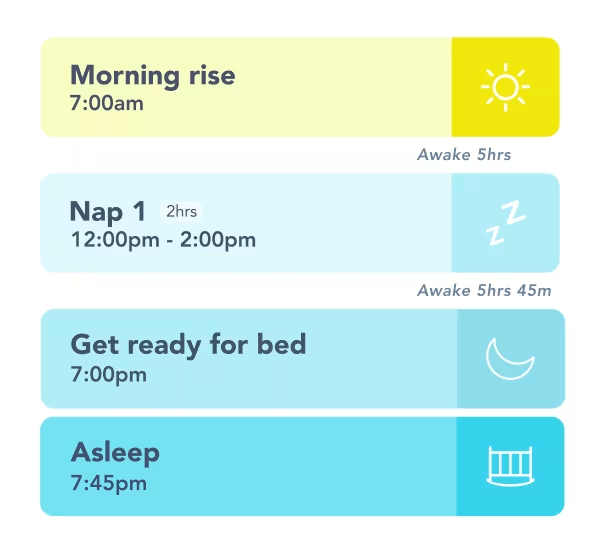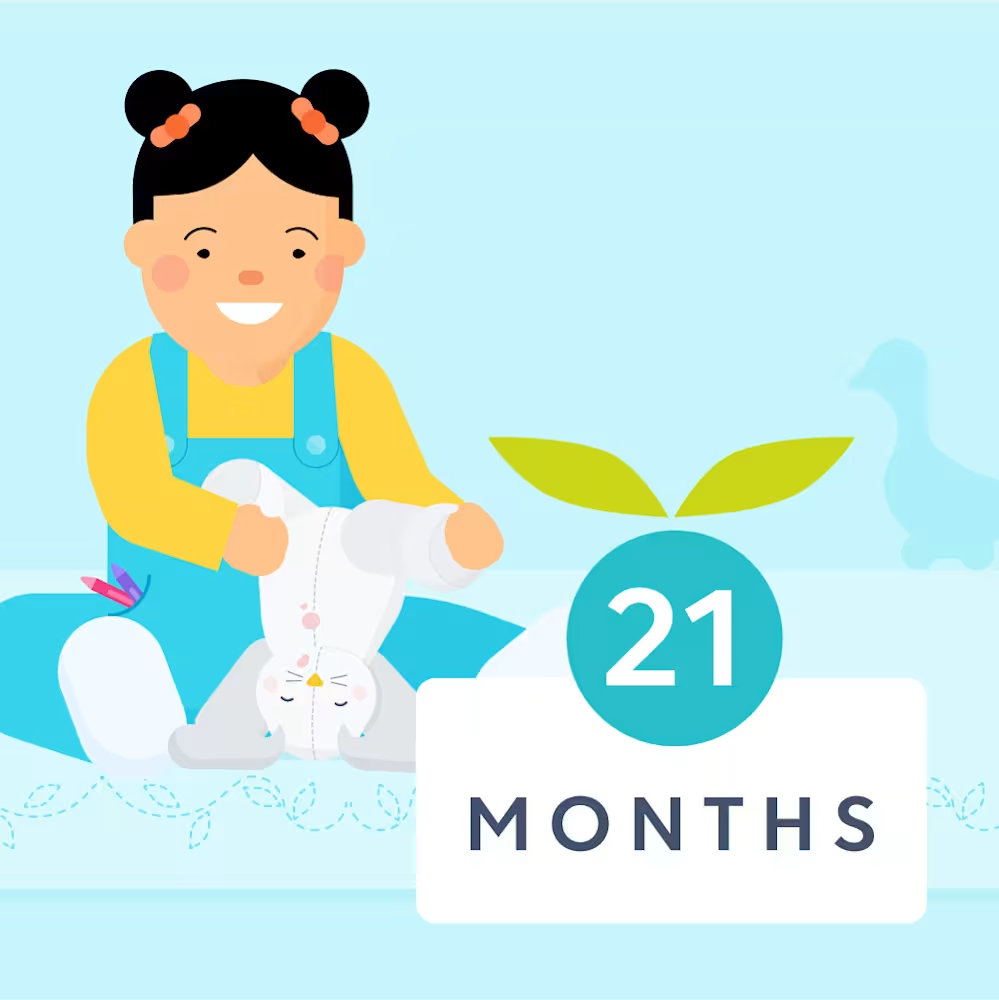20 month old sleep schedule: Bedtime and nap schedule
Updated Dec 15, 2025

Is your 20 month old’s bedtime now later than you feel it should be at this age? As your toddler gets closer to 2, you’ll find that their wake windows are lengthening. As a result, it’s common for bedtime to be later, which can be surprising — and, let’s face it, sometimes tough.
In this article we’ll walk you through a typical 20 month old sleep schedule, give you advise for navigating a "," and provide tips on making bedtime routines easier.
How much should a 20 month old sleep?
When your child is around 20 months, we recommend aiming for about 13 hours of total sleep per day (10 - 12 hours at night and 2 - 3 hours of day sleep in one nap). Most children need 5 - 5.75 hours of awake time between sleep periods at this age.
Around this age, many toddlers experience challenging sleep, often called the “.” However, this isn't tied to a specific age — it’s influenced by factors like separation anxiety, new motor skills, teething, or needing more help falling asleep.
Sleep challenges don’t follow a set timeline — your child might experience a disruption at 20 months instead of 18 months, or not at all. Sleep is influenced by many factors, making it far more complex than just reaching a certain age!
Also, each child is unique and sleep needs vary. Don't stress about reaching specific sleep hour targets, the recommended hours are just a rough estimate. It’s also important to monitor your child's mood and energy levels to ensure they get the rest they need. Here's a quick overview of what you may expect when it comes to 20 month olds and sleep. Note that these figures are averages and should be used as guidelines.
Top sleep tip for 20 month olds
As toddlers gain more independence, they may start taking a looong time to make choices. They want to do everything themselves — regardless of, you know, their actual capabilities at this age! If your during their bedtime routine, try offering definitive choices. Consider options like, “Do you want to wear the red pajamas or the blue ones?” or, “Would you like to brush your teeth or wash your face first?” This can help children feel in control while promoting more cooperation at bedtime.
Sample 20 month old sleep schedule

Note: Sleep needs vary by child, and this chart should be viewed as an example.
Morning rise: 7:00 AM
Wake window before nap: 5 hours
Nap: 12:00 PM - 2:00 PM (2 hour nap)
Get ready for bed: 6:45 PM
Wake window before bedtime: 5.75 hours
Asleep: 7:45 PM
Naptime schedule for a 20 month old
A typical schedule for 20 months old should include a nap in the middle of the day, approximately 5 - 5.5 hours after morning waking. For example, if your toddler wakes up around 7:00 AM, you’d offer a nap around noon or 12:30 PM. If you’d like a more predictable nap schedule, consider waking your child within the same 30-minute window each day. Anchoring the morning wake-up time can help regulate their body clock and make naptime and bedtimes smoother overall.
How long should a 20 month old nap?
A 20 month old’s nap schedule should allow for 2 - 3 hours of daytime sleep during one nap. Most toddlers need between 5 and 5.75 hours of awake time in between sleep periods at this age. If naps are consistently short, you may need to move the nap later or bedtime earlier, (but no earlier than 6:00 PM) to limit overtiredness. When kiddos become overtired, they usually have a harder time falling asleep and staying asleep.
How many naps for a 20 month old?
Aim for, with naptime beginning typically 5 - 5.5 hours after waking in the morning. Be sure to offer lunch before the nap so your toddler doesn’t wake up early because they’re hungry.
Here are some examples of what your day might look like at this age:
1-nap schedule
1-nap schedule with short nap/early bedtime
Bedtime for a 20 month old
At 20 months, your toddler may resist bedtime and refuse to participate in their typical bedtime routine. Testing boundaries is frustrating, but very normal as your kiddo gets closer to 2 years old. If this is the case at your house, avoid throwing in the towel on routines. Defined boundaries and consistent routines provide the structure toddlers need, even if they have a funny way of showing it.
What time should a 20 month old go to bed?
Most 20 month olds typically need 10 – 12 hours of sleep each night, with bedtime occurring about 12 – 14 hours after they wake up in the morning, assuming they've had a good nap. So that means a bedtime between 6:00 - 8:00 PM works well for many families. It's important to remember that bedtime isn't solely determined by how long they've been awake. Three main factors influence a child's sleep:
Acute sleep pressure: This refers to how long they've been awake.
Chronic sleep pressure: Sleep debt that accumulates over several days.
Circadian rhythm: The body's natural internal clock.
If your toddler's nap is shorter than usual, putting them to bed a bit earlier can help prevent them from becoming overtired. Overtiredness often results in shorter nights and waking up too early. However, it’s best to keep their bedtime fairly consistent because their circadian rhythm encourages sleep at roughly the same time every night. Setting bedtime too early can interfere with their wake maintenance zone, making it harder for them to fall asleep.
So, instead of only looking at wake windows, try to create a balanced daily schedule that takes into account their typical naps, overall sleep needs, and consistent morning wake time. Making small adjustments can help prevent ongoing sleep debt while keeping bedtime predictable, which usually leads to better sleep overall.
Why does my 20 month old keep waking up at night crying?
If your 20 month old has started waking up again overnight, this may be due to common factors at this age like:
Seeking independence
Mastering milestones
Teething
Separation anxiety
Illness
Parent-led sleep associations
If you’re looking for more sleep support, consider submitting for a personalized, step-by-step Sleep Plan via .
Is there a sleep regression at 20 months?
If your kiddo is newly resisting or skipping naps, waking early, and/or waking up more at night at this age, we’d call this a sleep regression. However, there isn’t a so-called “” where your little one will suddenly sleep terribly. Instead, contributing factors (like separation anxiety, developmental milestones, teething, and illness) can lead to new sleep challenges at various stages of development.
Can my 20 month old sleep with a pacifier?
Many parents are concerned about the long-term effects of pacifier use (beyond age 2–4) as it can impact teeth alignment and mouth development. However, this usually isn’t a concern until permanent teeth start coming in. Some experts recommend addressing the habit around age 3, while the AAP suggests most kids won't need treatment until age 5 [].
Can a 20 month old sleep on their stomach or side?
By 20 months, your child can safely sleep on their stomach or side if they roll there on their own and can move front to back and back to front. Allowing them to choose their sleep position is a normal part of toddler sleep.
Can I sleep train a 20 month old?
Sleep training can help your to fall asleep without help (e.g. being rocked, patted, or fed to sleep). There are various to consider — some are gradual and take longer while others produce faster results and may have more tears upfront. However, this is typically short-lived. And not all methods are “cry it out” techniques. When thinking about sleep training, choose the method that fits your child and parenting preferences.
What are the developmental milestones for a 20 month old?
At , many children are learning to jump, sort shapes, and use more words. Here’s what your toddler may be trying and doing this month:
Starts to jump with both feet leaving the ground
Runs
Stands on tiptoes
Climbs on low furniture
Kicks large ball
Goes up and down stairs (with support)
Flips switches on and off
Scribbles
Sorts shapes and colors
Stacks 4+ or more small blocks or toys
Takes toys apart and puts them back together
Uses at least 50 words (19 - 21 months)
Consistently imitates new words (19 - 21 months)
Understands simple pronouns (me, you, my) (19 - 21 months)
Identifies 3 - 5 body parts when named (19 - 21 months)
Locates objects you’re pointing to
Eats with a spoon (19 - 24 months)
Does a 20 month old need to eat during the night?
At 20 months, most children do not need to eat overnight. However, if you think your kiddo is waking overnight (or waking up extra early) because they’re hungry, consider what time and how much they’re eating dinner. If dinner is on the early side, consider moving it a bit later or offering a pre-bed healthy snack to help ensure your little one gets enough calories in during the day.
Takeaway
At 20 months, we recommend aiming for about 13 hours of total sleep per day (10 - 12 hours at night and 2 - 3 hours of day sleep in one nap).
A typical schedule for 20 months old should include a nap in the middle of the day, approximately 5 - 5.5 hours after morning waking.
If your toddler is stalling during their bedtime routine, try offering definitive choices. Consider options like, “Do you want to wear the red pajamas or the blue ones?”
If you're curious about what lies ahead in the coming month, glimpse into the future to see what you might experience once your baby is on a . Also check out a to see how far your little one has come.
Share article:
Note: The content on this site is for informational purposes only and should not replace medical advice from your doctor, pediatrician, or medical professional. If you have questions or concerns, you should contact a medical professional.
2 Sources
Share article:






